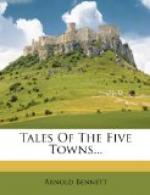‘I’m just the least bit glad she didn’t see me.’
He had the suspicion, which recurs even to optimists, that happiness is after all a chimera.
The third disaster was that the sun set and darkness descended. Mr. Curtenty had, unfortunately, not reckoned with this diurnal phenomenon; he had not thought upon the undesirability of being under compulsion to drive geese by the sole illumination of gas-lamps lighted by Corporation gas.
After this disasters multiplied. Dark and the rain had transformed the farce into something else. It was five-thirty when at last he reached The Firs, and the garden of The Firs was filled with lamentable complainings of a remnant of geese. His man Pond met him with a stable-lantern.
‘Damp, sir,’ said Pond.
‘Oh, nowt to speak of,’ said Mr. Curtenty, and, taking off his hat, he shot the fluid contents of the brim into Pond’s face. It was his way of dotting the ‘i’ of irony. ‘Missis come in?’
‘Yes, sir; I have but just rubbed the horse down.’
So far no reference to the surrounding geese, all forlorn in the heavy winter rain.
‘I’ve gotten a two-three geese and one gander here for Christmas,’ said Mr. Curtenty after a pause. To inferiors he always used the dialect.
‘Yes, sir.’
’Turn ’em into th’ orchard, as you call it.’
‘Yes, sir.’
‘They aren’t all here. Thou mun put th’ horse in the trap and fetch the rest thysen.’
‘Yes, sir.’
‘One’s dead. A roadman’s takkin’ care on it in Oldcastle Street. He’ll wait for thee. Give him sixpence.’
‘Yes, sir.’
‘There’s another got into th’ cut [canal].’
‘Yes, sir.’
’There’s another strayed on the railway-line—happen it’s run over by this.’
‘Yes, sir.’
’And one’s making the best of her way to Oldcastle. I couldna coax her in here.’
‘Yes, sir.’
’Collect ’em.’
‘Yes, sir.’
Mr. Curtenty walked away towards the house.
‘Mester!’ Pond called after him, flashing the lantern.
‘Well, lad?’
‘There’s no gander i’ this lot.’
‘Hast forgotten to count thysen?’ Mr. Curtenty answered blithely from the shelter of the side-door.
But within himself he was a little crest-fallen to think that the surviving gander should have escaped his vigilance, even in the darkness. He had set out to drive the geese home, and he had driven them home, most of them. He had kept his temper, his dignity, his cheerfulness. He had got a bargain in geese. So much was indisputable ground for satisfaction. And yet the feeling of an anticlimax would not be dismissed. Upon the whole, his transit lacked glory. It had begun in splendour, but it had ended in discomfort and almost ignominy. Nevertheless, Mr. Curtenty’s unconquerable soul asserted itself in a quite genuine and tuneful whistle as he entered the house.




